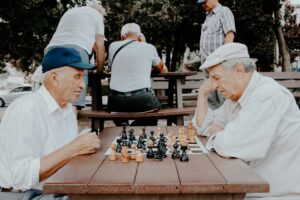These brain-boosting activities are great for the whole family.

Many of us will be getting family favourites such as Scrabble and Chess out of the cupboard over the Christmas period to enjoy with our loved ones. Lots of these beloved games are referred to as ‘mind sports’ as they help exercise our brain. We have spoken to some experts who have explained how these activities enhance brain function and why regularly engaging in them can help maintain mental sharpness in later life.
What are the benefits?
“Engaging in mind sports offers substantial cognitive benefits, particularly for maintaining mental sharpness as we age,” says Dr Steve Allder, consultant neurologist at Re:Cognition Health. “They provide a diverse range of mental challenges that can improve control of attention (focus), working memory, planning, imagination and other aspects of executive cognitive function, making them invaluable tools for lifelong brain health. “They are even more powerful if they involve social interaction.”
How often should we be doing them?
“The more often you can do brain-boosting exercises, the better,” recommends Suzanne Mumford, head of dementia and lifestyles at Care UK. “Daily is ideal, but if that isn’t achievable then three to five times a week is advisable.”
What could the consequences be later in life if you don’t stimulate your brain?
“Common signs that we’re not looking after our brains the best we could is forgetting important things, finding it hard to pay attention or think clearly,” explains Natalie Mackenzie, brain expert and cognitive rehab therapist. “When it comes to cognitive decline as we age, research suggests that learning a new skill can help with cognitive decline that we all worry about.”
Here are six of the best mind sports to try…
Backgammon
“Backgammon combines strategic planning, probability and risk assessment, stimulating the prefrontal cortex and numerical reasoning areas of the brain,” explains Allder. “The game encourages adaptability and cognitive flexibility while improving mathematical reasoning and spatial awareness. “Additionally, the social aspect of playing backgammon can create connections and reduce stress.”
Cards
“Card games challenge cognitive flexibility, logical reasoning and math skills, stimulating the brain’s frontal lobe and numerical reasoning areas,” says Allder. “These games also encourage social interaction, which enhances mood and mental health. “Playing games like Bridge, Poker, Rummy or Solitaire improves memory, decision-making and adaptability, keeping the brain engaged and sharp.”
Crosswords
“Crosswords engage a number of cognitive domains (areas and processes) which help mental agility and sharpness,” explains Mackenzie. “They utilise memory processes for recalling words and knowledge, and therefore stimulate these neural pathways. “Critical and strategic thinking to enable problem solving is at work here, whilst expanding vocabulary. This then stimulates the memory processes of encoding and storage of these new learnings, more neural firing occurring.” Several studies have associated crosswords with delayed onset of memory decline in those later diagnosed with dementia, adds Mumford. “Dementia is linked with loss of neural connection within the brain, while activities like crosswords can help create new ones – thus enabling older people living with the condition to mitigate the symptoms,” explains Mumford.
Chess
“Chess requires strategic thinking, memory and pattern recognition, engaging the prefrontal cortex and other critical areas of the brain,” says Allder. “It helps develop foresight, patience and problem-solving skills while promoting neuroplasticity, which enhances cognitive flexibility. “This makes chess particularly effective for maintaining sharpness later in life.”
Jigsaw Puzzles
“Jigsaws are all about problem-solving, which certain types of dementia can affect, such as vascular dementia,” says Mumford. “Doing jigsaw puzzles is a great way to maintain those skills, and there’s an added physical benefit to this one – dexterity. “Good motor skills are essential as we age, as they can help older people remain independent for longer.”
Scrabble
“Scrabble is a powerful tool for stimulating vocabulary, language skills and strategic thinking,” says Allder. “It activates the brain’s left hemisphere for language processing and the prefrontal cortex for planning and decision-making. “Players benefit by improving their vocabulary, memory and focus while enjoying social interaction, which can reduce loneliness and stress.”
(Article source: Silver Surfers)

